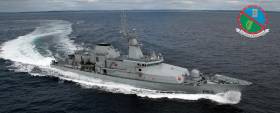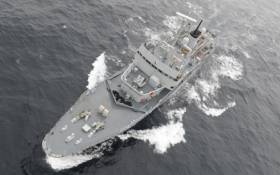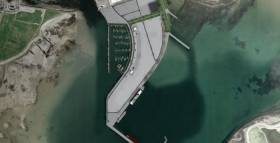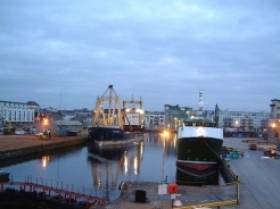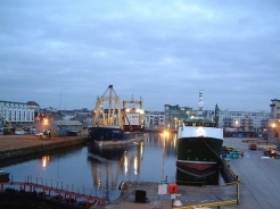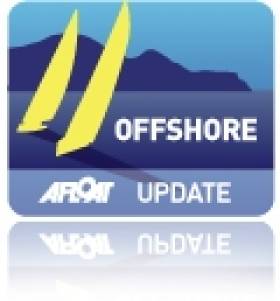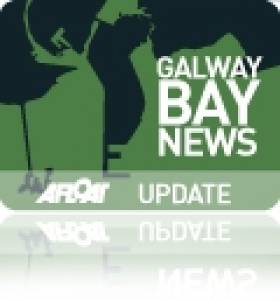Displaying items by tag: Galway Harbour News
LÉ William Butler Yeats Formally Commissioned Into Naval Service
#OPV90named - A new Irish Naval Service vessel costing in the region of €66m has been formally commissioned at a ceremony in Galway Port, reports RTE News.
After an address by the Taoiseach at Galway Harbour yesterday, the LÉ William Butler Yeats (P63) was officially named by a granddaughter of the poet, Caitriona Yeats.
The formal commissioning followed, before Lieutenant Commander Eric Timon led the crew aboard.
The LÉ William Butler Yeats replaces the LÉ Aisling in the naval fleet, after the latter was decommissioned last May.
Afloat adds that the third OPV90 class newbuild built by Babcock Marine, Appledore in the UK had paid a visit to Dun Laoghaire Harbour in late September.
She follows leadship LÉ Samuel Beckett and LÉ James Joyce, also completed by the north Devon shipyard. In recent weeks this pair switched deployment duties in providing humanitarian operations in the Mediterranean Sea.
#Decommissioning - Minister with Responsibility for Defence, Mr Paul Kehoe, yesterday attended the decommissioning ceremony of LÉ Aisling in Galway Docks.
LÉ Aisling was the longest serving vessel in the Irish Naval Service fleet. The ‘Deirdre’ class vessel built by Verolme Cork Dockyard was also an improved version as the final third ‘Emer’ class. She entered service in 1980.
The decommissioning ceremony took place of LÉ Aisling alongside Molvoy Quay at the port's Dun Aengus Dock. The direct successor will be newbuild OPV90 class LÉ William Butler Yeats which is to undergo builder’s trials next month.
Also previously reported on Afloat.ie the Government has placed an order for a fourth OPV90 'Beckett' class costing €54.3m from Babcock International’s north Devon yard.
In his address Minister Kehoe stated that: LÉ Aisling has been decommissioned after 36 years of outstanding service to the State and noted that during this time she travelled in excess of 628,000 nautical miles, an equivalent of circumnavigating the globe 32 times. Her crew has boarded over 5,500 vessels at sea and detained over 220 fishing vessels.
The Minister recalled that during her service, LÉ Aisling has been involved in many successful operations. The most notable of these include the arrest of the ‘Marita Ann’ in 1984 and her activities as the first vessel on the scene of the Air India disaster in 1985, for which several of her crew were decorated.
The Minister also stated: In pursuit of our commitment to progress the Ships Replacement Programme, the Government has provided a significant increase in capital funding to enhance the capabilities across the Defence Forces. The replacement vessel for LÉ Aisling, LÉ William Butler Yeats is scheduled for delivery shortly and the signing of contracts this week for delivery of a fourth vessel (see above), represent tangible demonstrations of this commitment.
LÉ Aisling is twinned with Galway and has had a long association with the city. The minister also praised the men and women who sailed on LÉ Aisling throughout her years of service, and marked out the great pride they had shown in her close association with the city and the many thousands of euro raised by them on behalf of the Children’s Ward in Galway University Hospital.
#PortExpansion - The Connacht Tribune writes that the Government has no intention of providing Galway Harbour with part-financing to enable expansion plans.
Shane Ross, the new Transport Minister, reiterated in Dáil Éireann that the State would not be funding the project, which is currently being assessed by An Bórd Pleanála.
“With regard to funding for ports, National Ports Policy 2013 clearly outlines that all port infrastructure development must be funded by the port companies, including Galway, on a commercial basis without recourse to the Exchequer,” said Minister Ross.
An oral hearing into the proposed €126 million development was held in January 2015.
For more on the story, click here
Port of Galway 'Disappointed' on Decision Delay
#DisappointedPort - Disappointment has been expressed by the Port of Galway at the delay in issuing a decision on the multi-million euro harbour extension, stating that it is difficult to plan for the future under such uncertainty.
The Galway Independent writes it has been almost two and a half years since the planning application to extend the port was submitted and the wait for a decision looks set to continue until the end of the year at least.
The €126 million port extension is a four-phase development that involves reclaiming 27 hectares of bay area, providing a new marina and berths which will see the biggest cruise liners in the world being able to dock at the harbour in the heart of the city.
The long awaited decision rests with An Bord Pleanala, who stated this week that they will be holding meetings with the National Parks and Wildlife Service and the applicant. These meetings have yet to be arranged.
Eamon Bradshaw, Chief Executive of the Port of Galway said, “The delay in issuing a formal decision is disappointing and whether the decision is for or against the port it is difficult for a commercial enterprise to deal with the uncertainty of the outcome of a planning application which planning was applied for in January 2014 or almost 2.5 years ago.”
He added that it is hoped that a formal decision will issue, at the latest, before the end of this year. “Should that decision be positive it is expected that the building of phase 1 would commence before the end of 2017 and complete by 2020,” Mr Bradshaw added.
At the weekend, Galway welcomed two cruise liners, the Astoria and L’Austral and passengers were tendered ashore from the ships.
For more the click the newspaper's report here.
Exclusion From EU Fund Brings Uncertainty For Galway Harbour
#Exclusion - The only port in Ireland to be excluded from a special EU fund is Galway Harbour and it’s future could be in jeopardy unless the situation is tackled, reports Galway Bay FM.
CEO of Galway Harbour Eamon Bradshaw says that the recent downgrade of the facility to a Port of Regional Significance means it does not quality for European funding.
He says that only ports classified as tier one or tier two facilities are entitled to assistance from the Ten-T Connecting Europe programme – assistance that the Port urgently needs. For more click here.
Revived Efforts to Bring Naomh Éanna Home to Galway
#NaomhÉanna - In a bid to bring the Naomh Éanna back to Galway, a new campaign has been launched according to Galway Bay FM. The historic vessel once carried passengers between the city and the Aran Islands, before being withdrawn from service in 1989.
It has been lying derelict in Ringsend, Dublin for over two decades. However, the engine room of the ship is still operational, and campaigners say if enough funds are raised, as previously reported on Afloat.ie, it will be possible to sail the vessel back to Galway as a major tourist attraction.
To read more click here on the veteran vessel that campaigners saved following controversial plans by Waterways Ireland to scrap her at Grand Canal Basin.
Minister's Decision on Port Welcomed by Galway Chamber
#Postponed- Minister for Transport and Tourism Paschal Donohoe TD, following cross party lobbying, on Wednesday announced he was to postpone signing the transfer of Port of Galway to Galway City Council for at least 18 months, which has been welcomed by Galway Chamber.
Speaking after the announcement President of Galway Chamber Frank Greene said that this will give time for the completion of the planning process as previously reported on Afloat.ie
The Galway Independent has more on the port postponement.
Environmental Measures by Galway Port Part of Docks Development
#PortEnvironment - Environmental compensatory measures made as part of the Galway Harbour Company’s plans for the expansion of the city’s docks will it is hoped by the port accepted by the National Parks and Wildlife Service.
According to Galway Bay FM (which has more here), the port company has sent a report to the NPWS in order to comply with requirements of An Bord Pleanála.
A meeting is due to take place between Galway Harbour Company and the NPWS once the report has been considered by the NPWS, with a view to sending a formal report to the planning authority.
In September, as previously reported on Afloat.ie, the harbour company was invited to progress plans for a port expansion through the fast-track IROPI process.
Plan for Docks Could Spark Regeneration of Galway
#GalwayPortPlan – The Connacht Tribune reports that the decision on Galway Harbour on the proposed redevelopment of the docks will be announced by An Bórd Pleanála next Friday, September 11.
The planning appeals board has been deliberating on plans for the €126 million redevelopment of the docks since an oral hearing took place in January.
The proposal has the potential to transform the face of Galway into the next century, according to proponents of the projects. The 85.4 hectare project, which is expected to take eight years to construct, will be built in four phases.
For more on the proposed expansion of the mid-west port, click this link.
Note the newspaper has a photo of the harbour showing leisure craft and commercial shipping sharing the port's Dún Aengus Dock.
On the right side can be seen the stern of the aptly named Galway Fisher, an oil products tanker that regularly calls to the port which requires a very skillful approach (see video) through the dock chamber.
Galway Port Redevelopment Decision Due this Month
#DelayedDecision – It has been confirmed by An Bórd Pleanála that it has delayed making a decision on the planning application to redevelop Galway Harbour, writes The Connacht Tribune.
The oral hearing into the proposed €126 million extension of the harbour was held in January and a decision was due in April or May. However, the planning appeals board has confirmed that the decision date has been pushed back by several weeks.
"The decision on this case has been deferred," a spokesperson said.
Asked why it had been deferred, the spokesperson added: "It's the general complexity of the issues in the case." It is the first application in the State to use the 'IROPI' route, which would allow a significant infrastructural development on a designated European habitat on the basis of 'Imperative Reasons of Overriding Public Interest'.
An Bórd Pleanála planners heard evidence from experts during an oral hearing that lasted over two weeks earlier this year as previously reported on Afloat.ie
For more on the story, click here.



























